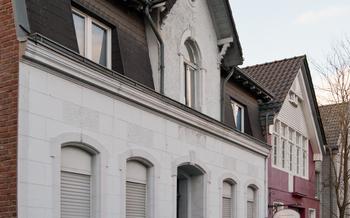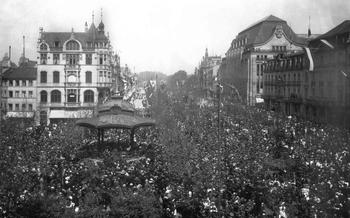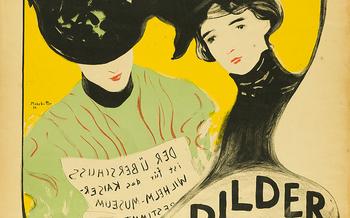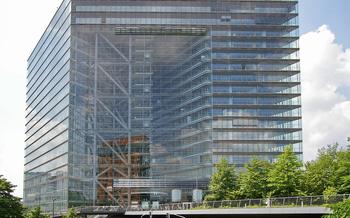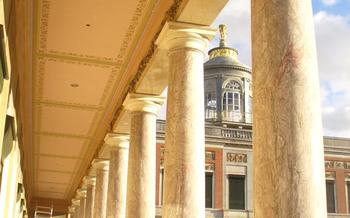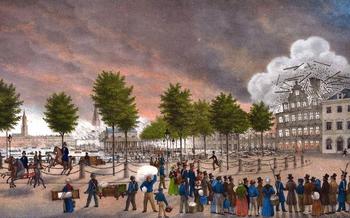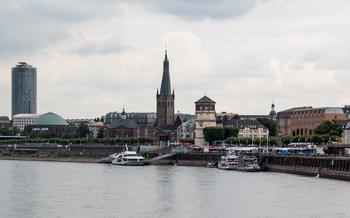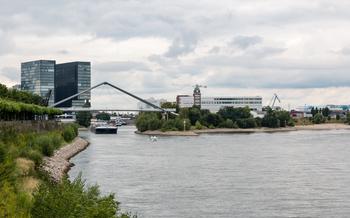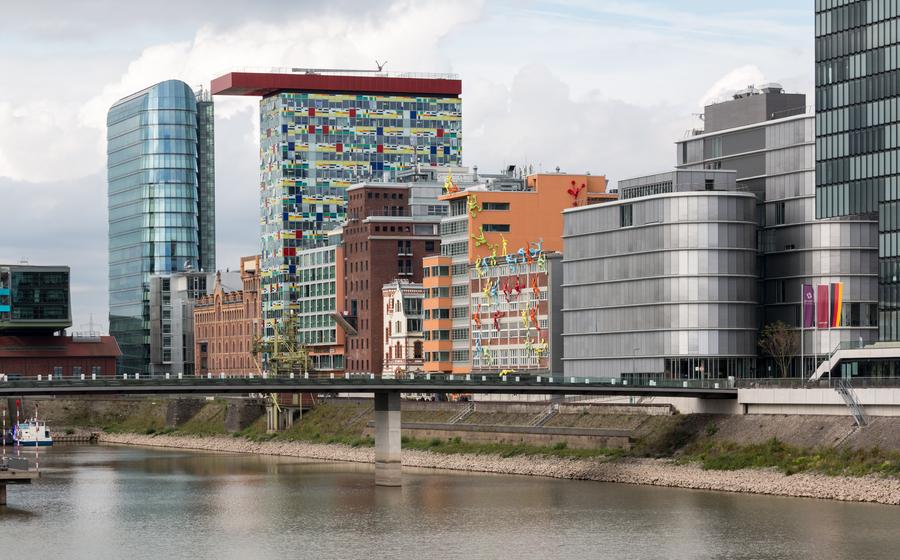
Heinrich Heine Birth House
- Heinrich Heine Birth House
- Early Life of Heinrich Heine
- Heine's Literary Career
- Heine's Political Activism
- Walking Tour of Heine's Düsseldorf
- Practical Tips:
- Heine's Impact on German Culture
- Heine's Ongoing Relevance
- Heine's International Reputation
- Heine's Jewish Identity
- Heine's Political Controversies
- Heine's Legacy in Contemporary Germany
- Heine's Works in Translation
- Heine's Humor and Satire
- Insider Tip: Exploring Heine's Düsseldorf Neighborhood
Heinrich Heine Birth House
The Heinrich Heine Birth House is a historical landmark and literary museum in Düsseldorf, Germany, dedicated to the life and work of the renowned German poet and writer Heinrich Heine. Born on December 13, 1797, Heine spent his early childhood years in this modest but charming house, which has since been transformed into a museum that offers a glimpse into his formative years and the cultural and historical context of his time.
The house itself is a testament to the architectural style of the late 18th century, with its simple yet elegant facade and traditional German design elements. It features a small courtyard with a replica of the famous bust of Heine, created by the sculptor Ernst Herter. The museum occupies two floors of the house, providing visitors with a comprehensive overview of Heine's life and achievements.
Early Life of Heinrich Heine
Heinrich Heine was born into a Jewish family in Düsseldorf, Germany, on December 13, 179His father, Samson Heine, was a successful textile merchant, and his mother, Betty van Geldern, was a well-educated woman from an affluent family. Heine's early childhood was marked by both privilege and adversity. He grew up in a comfortable home and received a good education, but he also experienced the discrimination and anti-Semitism that was prevalent in German society at the time.
Heine's family background and childhood experiences had a profound impact on his work. His Jewish identity and his experiences with anti-Semitism would become recurring themes in his writing. He would also draw on his childhood memories of Düsseldorf, a city that he both loved and hated, in his poetry and prose.
Heine's education was a key factor in his development as a writer. He attended the prestigious Düsseldorf Lyceum, where he studied literature, philosophy, and history. He also began writing poetry and prose at a young age, and his early work showed a talent for satire and social commentary.
Heine's early influences included the works of German Romantic writers such as Friedrich Schiller and Johann Wolfgang von Goethe. He was also inspired by the French Revolution and the ideals of liberty, equality, and fraternity. These influences would shape his political and literary development and lead him to become one of the most important figures of the Vormärz movement, a period of political and cultural ferment in Germany in the 1830s and 1840s.
Heine's Literary Career
Heinrich Heine's literary career spanned several decades and produced a diverse body of work that included poetry, prose, drama, and journalism. His major works include the poetry collections "Buch der Lieder" (Book of Songs), "Neue Gedichte" (New Poems), and "Romanzero", as well as the prose works "Reisebilder" (Travel Pictures) and "Die Harzreise" (The Harz Journey).
Heine's poetry is characterized by its lyrical beauty, emotional intensity, and sharp wit. He explored themes of love, nature, politics, and religion, often using irony and satire to express his views. His prose works are known for their vivid descriptions, humor, and insightful social commentary.
Heine's work was highly controversial in his own time, and he faced censorship and persecution for his political views and his critical writings about religion and society. Despite this, he gained a reputation as one of the most important and influential writers of his generation.
His work has been translated into more than 50 languages and has had a profound impact on writers around the world. He is considered one of the greatest poets of the German language, and his work continues to be read, studied, and enjoyed by readers of all ages.
Heine's Political Activism
Heinrich Heine was not only a literary genius but also a passionate political activist. His works often reflected his strong convictions and his commitment to social justice. He became a prominent figure in the Vormärz movement, a period of political and intellectual ferment in Germany in the 1830s and 1840s. Heine's writings criticized the oppressive Prussian government, advocated for freedom of speech and assembly, and expressed his support for the rights of the working class.
Heine's activism led to his exile in France in 1831, where he spent the rest of his life. From his Parisian exile, he continued to write and publish works that were critical of the Prussian regime. He became a symbol of resistance and a source of inspiration for other dissidents and revolutionaries. His writings reached a wide audience across Europe and contributed to the growing tide of revolutionary sentiment that eventually led to the revolutions of 184
Heine's political activism was motivated by his deep sense of injustice and his belief in the power of literature to effect social change. He saw himself as a voice for the voiceless and used his writing to expose the hypocrisy and oppression of the ruling classes. His works remain a powerful reminder of the importance of freedom of expression and the role of literature in promoting social justice.
Walking Tour of Heine's Düsseldorf
A captivating way to delve into the life and legacy of Heinrich Heine is to embark on a literary pilgrimage through his beloved Düsseldorf. Stroll along the elegant Königsallee, where Heine's birthplace stands as a testament to his profound influence on German literature. Immerse yourself in the historical context of Heine's time as you explore landmarks such as the Alte Akademie, where he studied law, and the Hofgarten, a tranquil oasis where he sought inspiration.
Follow in the footsteps of Heine's literary journey by visiting the Düsseldorf Schauspielhaus, where his plays were once performed, and the Heine Monument, a poignant tribute to his enduring spirit. Don't miss the Heinrich Heine University, a modern institution that carries the torch of his intellectual legacy.
To enhance your experience, consider joining a guided walking tour led by a knowledgeable local guide. These tours often provide insightful commentary, anecdotes, and historical context, bringing Heine's Düsseldorf to life in a captivating way. Whether you choose to explore independently or with a guide, this literary pilgrimage offers a unique opportunity to connect with the spirit of one of Germany's most celebrated poets.
Practical Tips:
- Wear comfortable shoes, as the walking tour covers a significant distance.
- Bring a camera to capture the picturesque landmarks and historical sites.
- Plan your visit during the warmer months to enjoy the pleasant weather and outdoor ambiance.
- Take advantage of the many cafes and restaurants in the area to rest and refuel along the way.
- Allow ample time to explore each landmark and delve into the historical context of Heine's life and work.
Heine's Impact on German Culture
A towering figure in German literature, Heinrich Heine left an indelible mark on the nation's cultural landscape. His contributions to German literature are multifaceted and profound. Heine's works, characterized by their lyrical brilliance, wit, and social commentary, have become an integral part of the German literary canon. His influence extends far beyond his own writings, as he served as a mentor and inspiration to countless subsequent writers, including Bertolt Brecht, Thomas Mann, and Hermann Hesse.
One of Heine's most notable contributions to German culture is his pioneering role in the development of the Romantic movement. His early works, such as "Buch der Lieder" (Book of Songs), exemplified the Romantic spirit, with their focus on nature, emotion, and the individual. Heine's unique blend of Romanticism and social criticism earned him a reputation as a revolutionary writer, challenging conventional norms and pushing the boundaries of literary expression.
Heine's impact on German culture extends beyond his literary achievements. As a political activist and social commentator, he played a pivotal role in shaping public opinion and challenging the status quo. His writings tirelessly advocated for social justice, equality, and freedom of expression. Heine's activism and his unwavering commitment to social progress continue to resonate in contemporary German society, making him an enduring figure in the nation's cultural and political discourse.
Heine's legacy as a cultural icon is further cemented by his enduring popularity among German readers. His works remain widely read and studied, inspiring new generations with their timeless themes and enduring relevance. His poetry and prose have been translated into numerous languages, making him one of the most widely-read German authors worldwide.
Heine's Ongoing Relevance
In contemporary Germany, Heine's legacy is celebrated and honored in various ways. His birthplace in Düsseldorf is now a museum dedicated to his life and work, attracting visitors from around the world. Numerous streets, squares, and institutions bear his name, serving as a testament to his enduring influence. His works continue to be adapted for stage, screen, and other artistic mediums, ensuring that his message and his art remain relevant and accessible to new audiences.
Heine's impact on German culture is undeniable. His literary genius, his political activism, and his enduring popularity have cemented his status as one of the most influential figures in German history. His works continue to be read, studied, and celebrated, ensuring that his legacy will live on for generations to come.
Heine's International Reputation
Heinrich Heine's work has been translated into more than 100 languages, making him one of the most widely read German authors in the world. His poetry and prose have been particularly influential in France, where he lived in exile for many years. He was also praised by many English-speaking writers, such as Matthew Arnold, William Wordsworth, and George Eliot.
In the United States, Heine's work was first introduced to a wider audience by the Transcendentalists, who were drawn to his Romantic and revolutionary ideas. His poetry was translated by Henry Wadsworth Longfellow and Edgar Allan Poe, among others. In the 20th century, Heine's work was rediscovered by a new generation of American readers, thanks in part to the efforts of the Beat poets, who saw him as a kindred spirit.
Heine's international reputation is based on the universal appeal of his work. His poetry is characterized by its wit, irony, and passion, and his prose is incisive and thought-provoking. He wrote about love, loss, politics, and religion, and his work continues to resonate with readers around the world.
Heine's international reputation is also due to his role as a cultural intermediary. He was one of the first German writers to introduce French and English literature to a German audience. He also wrote about his experiences as a Jewish writer in Germany, which helped to raise awareness of anti-Semitism in Europe.
Heine's work has had a profound impact on world literature. He is considered one of the most important figures of the Romantic movement, and his work has influenced writers from Baudelaire to Brecht. He is also one of the most important German-Jewish writers, and his work has helped to shape Jewish identity in Germany and beyond.
Heine's Jewish Identity
Heinrich Heine was born into a Jewish family in Düsseldorf and his Jewish identity played a significant role in his life and work. He experienced anti-Semitism firsthand, both in his personal life and in the broader social and political context of his time. These experiences shaped his views on religion, identity, and social justice, and he often explored Jewish themes in his writing.
Despite his Jewish heritage, Heine was critical of organized religion and rejected the idea of a separate Jewish nation. He believed that Jews could assimilate into German society while maintaining their cultural and religious traditions. However, he also recognized the challenges faced by Jews in a society marked by anti-Semitism and prejudice.
Heine's exploration of Jewish identity and his critique of anti-Semitism contributed to a broader cultural dialogue about the role of Jews in German society. His work helped to challenge traditional notions of Jewishness and contributed to a more nuanced understanding of Jewish identity in Germany.
Heine's Political Controversies
Heinrich Heine's writings often sparked controversy due to their political and social commentary. His criticism of the Prussian government and his advocacy for social justice made him a target of censorship and persecution. In 1835, his book "Zur Geschichte der Religion und Philosophie in Deutschland" was banned in Prussia for its alleged blasphemy and anti-Christian sentiments. Heine's political activism and writings led to his exile from Germany in 1831, and he spent the rest of his life in France.
Despite the controversies surrounding his work, Heine remained a popular and influential figure in German literature. His writings continued to be read and discussed, even though they were often banned or censored. Heine's legacy as a writer and political activist is still debated today, and his work continues to be the subject of scholarly research and analysis.
Heine's Legacy in Contemporary Germany
Heinrich Heine's legacy in contemporary Germany is celebrated and honored in various ways. His birthplace in Düsseldorf has been transformed into a museum dedicated to his life and work. Numerous monuments and memorials have been erected in his honor, including the Heine Monument in Düsseldorf's Hofgarten and the Heine Fountain in Berlin.
Literary awards and prizes, such as the Heinrich Heine Prize, are bestowed upon writers who demonstrate a commitment to social justice and freedom of expression, values that Heine himself championed. Ongoing scholarship and research on Heine's life and work contribute to a deeper understanding of his significance in German literature and history.
The Heinrich Heine Society, founded in 1956, plays a crucial role in preserving and promoting Heine's legacy. Through conferences, publications, and educational initiatives, the society fosters a lively exchange among scholars, enthusiasts, and the general public, ensuring that Heine's ideas and contributions continue to inspire and resonate in contemporary Germany.
Heine's Works in Translation
Translating Heine's poetry presents a unique set of challenges due to its complex wordplay, intricate rhymes, and cultural references. Translators must not only capture the literal meaning of his words but also convey their musicality, humor, and emotional depth.
Notable translators who have taken on the task of rendering Heine's poetry into English include Edgar Alfred Bowring, Louis Untermeyer, and John Banville. Each translator has brought their own unique approach and style to the challenge, resulting in a diverse range of English translations.
Bowring's translations, published in the mid-19th century, are known for their accuracy and faithfulness to the original German texts. Untermeyer's versions, produced in the early 20th century, are more interpretive and focus on capturing the spirit and tone of Heine's poetry. Banville's recent translations, published in the 21st century, are praised for their elegance, wit, and poetic flair.
The availability of Heine's works in translation has played a crucial role in his international reputation and recognition. English translations have made his poetry accessible to a wider audience, allowing readers around the world to appreciate his literary genius and cultural significance.
Heine's Humor and Satire
Heinrich Heine is renowned for his witty and satirical writing style. He masterfully employs humor as a weapon to critique and expose the social, political, and cultural shortcomings of his time. His poems, plays, and prose are filled with clever wordplay, irony, and sarcasm, often targeting the hypocrisy and pomposity of the ruling classes and the bourgeoisie.
Heine's satire is particularly evident in his political writings, where he lampoons the authoritarianism of the Prussian government and the conservative establishment. His poem "Germany, a Winter's Tale" is a biting satire of German society, criticizing the political oppression, censorship, and militarism that prevailed during his lifetime. Through his satirical verses, Heine sought to awaken the consciousness of his readers and provoke them to question the status quo.
In addition to his political satire, Heine also used humor to explore personal and romantic themes. His love poems, for example, are often infused with wit and irony, expressing both his deep affection and his playful detachment. Heine's ability to find humor in the complexities of human relationships and emotions adds a unique charm and depth to his work.
Heine's legacy as a humorist and satirist continues to inspire and influence writers and comedians to this day. His ability to blend humor with social commentary and political critique has earned him a reputation as one of the masters of satire in German literature.
Insider Tip: Exploring Heine's Düsseldorf Neighborhood
To delve deeper into the world of Heinrich Heine, venture beyond the Birth House and explore the surrounding neighborhood of Bolkerstraße. This vibrant area, steeped in history and culture, offers a glimpse into the poet's life and inspirations.
Start your journey at the Heine Monument, an impressive bronze statue that stands proudly in front of the Town Hall. This majestic tribute to Heine captures his essence as a towering figure in German literature.
From there, stroll along Bolkerstraße, a charming pedestrianized street lined with historic buildings, boutiques, and inviting cafes. Immerse yourself in the lively atmosphere as you trace Heine's footsteps through the district.
Make sure to visit the Andreas Quarter, where Heine spent his childhood. This picturesque neighborhood, with its narrow cobblestone streets and colorful facades, provides a glimpse into the poet's early life and influences.
For a culinary adventure, savor the flavors of traditional German cuisine at one of the many restaurants in the area. Indulge in hearty dishes like Himmel und Ääd (blood sausage with mashed potatoes) or Rheinischer Sauerbraten (marinated beef with a sweet and sour sauce).
Don't miss the opportunity to visit the numerous cultural institutions in the neighborhood, including the Stadtmuseum Düsseldorf, which houses a collection of artifacts and documents related to the city's history, including exhibits on Heine's life and work.
As you explore Heine's Düsseldorf neighborhood, you'll discover a vibrant blend of history, culture, and local charm, offering a unique perspective on the life and legacy of one of Germany's most celebrated poets.
